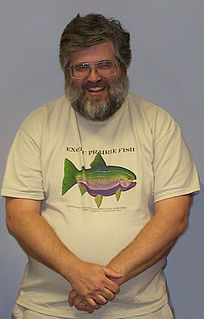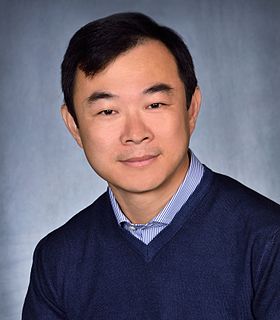
Carnegie Mellon University (CMU) is a private research university based in Pittsburgh, Pennsylvania. Founded in 1900, the university is the result of a merger of the Carnegie Institute of Technology and the Mellon Institute of Industrial Research. Established by Andrew Carnegie as the Carnegie Technical Schools, the university became the Carnegie Institute of Technology in 1912 and began granting four-year degrees. In 1967, the Carnegie Institute of Technology merged with the Mellon Institute of Industrial Research, formerly a part of the University of Pittsburgh. Since then, the university has operated as a single institution.

DEF CON is one of the world's largest and most notable hacker conventions, held annually in Las Vegas, Nevada. The first DEF CON took place in June 1993 and today many attendees at DEF CON include computer security professionals, journalists, lawyers, federal government employees, security researchers, students, and hackers with a general interest in software, computer architecture, hardware modification, conference badges, and anything else that can be "hacked". The event consists of several tracks of speakers about computer- and hacking-related subjects, as well as cyber-security challenges and competitions. Contests held during the event are extremely varied, and can range from creating the longest Wi-Fi connection (aircrack-ng) to finding the most effective way to cool a beer in the Nevada heat.

The School of Computer Science (SCS) at Carnegie Mellon University in Pittsburgh, Pennsylvania, US is a school for computer science established in 1988. It has been consistently ranked among the top computer science programs over the decades. As of 2010 U.S. News & World Report ranks the graduate program as tied for 1st with Massachusetts Institute of Technology, Stanford University, and University of California, Berkeley. It is ranked 1st in the United States on Computer Science Open Rankings, which combines scores from multiple independent rankings.

Carnegie Mellon Silicon Valley is a degree-granting branch campus of Carnegie Mellon University located in the heart of Silicon Valley in Mountain View, California. It was established in 2002 at the NASA Ames Research Center in Moffett Field. The campus offers full-time and part-time professional Masters programs in Electrical And Computer Engineering, Software Engineering and Software Management, various bi-coastal Masters programs in Information Technology, and a bi-coastal Ph.D. program in Electrical and Computer Engineering. One key differentiator between programs in the traditional Pittsburgh campus and the new Silicon Valley campus is a new focus on project-centered learning by doing approach to education.

The Human–Computer Interaction Institute (HCII) is a department within the School of Computer Science at Carnegie Mellon University (CMU) in Pittsburgh, Pennsylvania. It is considered one of the leading centers of human–computer interaction research, and was named one of the top ten most innovative schools in information technology by Computer World in 2008. For the past three decades, the institute has been the predominant publishing force at leading HCI venues, most notably ACM CHI, where it regularly contributes more than 10% of the papers. Research at the institute aims to understand and create technology that harmonizes with and improves human capabilities by integrating aspects of computer science, design, social science, and learning science.

George Francis Hotz, alias geohot, is an American security hacker, entrepreneur, and software engineer. He is known for developing iOS jailbreaks, reverse engineering the PlayStation 3, and for the subsequent lawsuit brought against him by Sony. Since September 2015, he has been working on his vehicle automation machine learning company comma.ai.

Randolph Frederick Pausch was an American educator, a professor of computer science, human–computer interaction, and design at Carnegie Mellon University (CMU) in Pittsburgh, Pennsylvania.

{{Infobox scientist | name = Scott E. Hudson | image = ScottEHudson.jpg | image_size = 171px | residence = Pittsburgh, PA | citizenship = United States | nationality = United States | field = Human-Computer Interaction | work_institutions = Carnegie Mellon University | alma_mater = University of Colorado (PhD) | prizes = [[CHI Academy][SIGCHI Lifetime Research Award]] }}

David Brumley is a Professor at Carnegie Mellon University. He is a well-known researcher in software security, network security, and applied cryptography. Prof. Brumley also worked for 5 years as a Computer Security Officer for Stanford University.

Christopher Granger Atkeson is an American roboticist and a professor at the Robotics Institute and Human-Computer Interaction Institute at Carnegie Mellon University (CMU). Atkeson is known for his work in humanoid robots, soft robotics, and machine learning, most notably on locally weighted learning.

Kiron Kanina Skinner is a former Director of Policy Planning at the United States Department of State in the Trump administration. Prior to that, she was the Taube Professor of International Relations and Politics at Carnegie Mellon University, and the founding director of the Institute for Politics and Strategy and associated centers at the university. She is also the W. Glenn Campbell Research Fellow at the Hoover Institution. Since leaving the Department of State, she has returned to her position at Carnegie Mellon University.
Positive Hack Days (PHDays) is a computer security conference held every year in Moscow. The first conference was held in 2011. The conference addresses such topics as zero-day attacks and digital investigations, cryptography and cyberwarfare, the security of a person and a state in the cyberworld. Attendance fee is required. Free tickets are available for winners of special hacking contests and for students who participated in the Positive Education program.

Eric Poe Xing is an American computer scientist, academic administrator, entrepreneur, and president of Mohamed bin Zayed University of Artificial Intelligence (MBZUAI). Prior to his appointment as President of MBZUAI, Xing was a professor in the School of Computer Science at Carnegie Mellon University and researcher in machine learning, computational biology, and statistical methodology. Xing is also the Founder, Chairman, Chief Scientist, and former CEO of Petuum Inc.

The Computational Biology Department (CBD) is a division within the School of Computer Science at Carnegie Mellon University in Pittsburgh, Pennsylvania, United States. It is located in the Gates-Hillman Center. Established in 2007 by Robert F. Murphy as the Lane Center for Computational Biology with funding from Raymond J. Lane and Stephanie Lane, CBD became a department within the School of Computer Science in 2016.
The Carnegie Mellon CyLab Security and Privacy Institute is a computer security research center at Carnegie Mellon University. Founded in 2003 as a university-wide research center, it involves more than 50 faculty and 100 graduate students from different departments and schools within the university. It is "one of the largest university-based cyber security research and education centers in the U.S."
Jessica K. Hodgins is an American roboticist and researcher who is a professor at Carnegie Mellon's Robotics Institute and School of Computer Science. Hodgins is currently also Research Director at the Facebook AI Research lab in Pittsburgh next to Carnegie Mellon. She was elected the president of ACM SIGGRAPH in 2017. Until 2016, she was Vice President of Research at Disney Research and was the Director of the Disney Research labs in Pittsburgh and Los Angeles.

Chris Harrison is a British-born, American computer scientist and entrepreneur, working in the fields of human–computer interaction, machine learning and sensor-driven interactive systems. He is a professor at Carnegie Mellon University and director of the Future Interfaces Group within the Human–Computer Interaction Institute. He has previously conducted research at AT&T Labs, Microsoft Research, IBM Research and Disney Research. He is also the CTO and co-founder of Qeexo, a machine learning and interaction technology startup.
Phillip Gibbons, formerly of Intel Labs Pittsburgh, is a professor in the Computer Science Department and the Electrical & Computer Engineering Department at Carnegie Mellon University.
Hideto Tomabechi is an Japanese cognitive scientist computer scientist.
Cleotilde Gonzalez is a Research Professor of Decision Sciences in the Social and Decision Sciences Department. She is also the founding director of the Dynamic decision-making laboratory at Carnegie Mellon University. Gonzalez is also affiliated with the Security and Privacy Institute (CyLab), the Center for Behavioral Decision Research (CBDR), the Human Computer Interaction Institute, the Center for Cognitive Brain Imaging, and the Center for Neural Basis of Cognition.
















